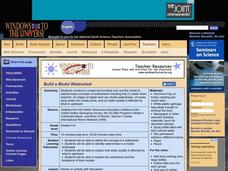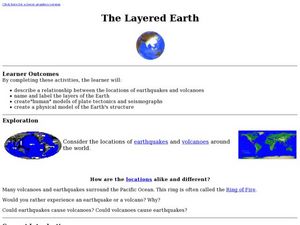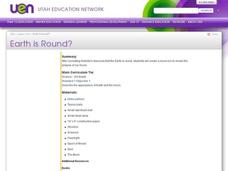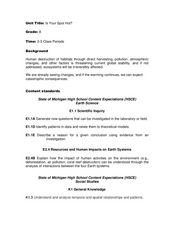Curated OER
The Chemistry of Refining Crude Oil
Consider our energy sources: wood, coal, oil, uranium. Learners compare the pollution to energy produced for each. They practice fractional distillation of an alcohol/water mixture to simulate the process of refining crude oil....
National Geographic
Mapping the Shape of Everest
With Mount Everest as the motivator, your earth science class learns about topographic maps. Begin by showing a film clip from The Wildest Dream: Conquest of Everest, featuring fearsome virtual imagery of a path up world's tallest peak....
Curated OER
Create a Cloud in a Bottle
Meteorology or earth science classes reach for the sky with this lesson plan! You will need to purchase a Fizz Keeper® device and temperature strip for each lab group if you want them to perform this as an activity rather than you doing...
Curated OER
Carbon Dioxide - Sources and Sinks
Where does all of the carbon dioxide come from that is supposedly leading to climate change? Earth science pupils test animal, plant, and fossil fuels as sources in this investigation. Using an indicator, BTB, they are able to detect the...
Brooklyn Children’s Museum
Rocks and Minerals in Our Lives
Young geologists discover the important role that rocks and minerals play in our everyday lives through this series of hands-on activities. Starting off with a lesson that defines the difference between plants, animals, and minerals,...
PBS
Earthquakes and Volcanoes
Earth's surface constantly changes thanks to a variety of geological forces; in fact, Australia currently moves faster than GPS technology. Scholars connect the idea of continental drift to earthquakes and volcanoes with the help of an...
Ocean Explorer
Architects of the Coral Reef
Coral Reefs are the focus of a life science lesson plan. Upper graders look at how coral reefs are formed, how the animals and plants reproduce, and the variety of ways that humans benefit from coral reefs around the world. Groups of...
Curated OER
Use Google Maps to Teach Math
Capture the engagement of young mathematicians with this upper-elementary math instructional activity on measuring time and distance. Using Google Maps, students first measure and compare the distance and time it takes to travel between...
Curated OER
Circle of Life
Here is a well-designed science lesson that shows learners that everything that organisms do in ecosystems, including running, breathing, burrowing, growing, requires energy. After a thorough discussion of their own eating and drinking...
Curated OER
Dante's Peak Movie Review
Middle or high school volcanologists watch the 1997 film, Dante's Peak. They make observations as they watch and then write a movie review, focusing on what was accurately represented. They also point out what facts were stretched by...
Curated OER
Thermal Expansion and Sea Level Rise
Placing a thermometer and a glass tube into a flask of cold water and sealing it, you can expose it to heat and very visually demonstrate thermal expansion to your earth science class. Follow it with a discussion about how the increasing...
Curated OER
Build a Model Watershed
Collaborative earth science groups create a working model of a watershed. Once it has been developed, you come along and introduce a change in land use, impacting the quality of water throughout their watershed. Model making is an...
Howard Hughes Medical Institute
Calculating Iridium Fallout from an Asteroid Impact
Should we be afraid of a large asteroid impact on Earth today? Young scientists estimate the size and composition of an asteroid similar to the one that caused the K-T mass extinction. They apply algebraic formulas to answer questions...
Will Stegar Foundation
Citizen Climate
Many of the leading scientists in the world are studying climate change, and your learners can join in the discussion with a unit from the Will Steger Foundation. High schoolers work on eight lessons that focus on different aspect of...
Curated OER
The Layered Earth
Learners role play plate tectonics by creating a "plate statue" made up of students. In this earth science lesson, learners describe how Earth's movement cause earthquakes and volcanoes. They draw and name the different layers of the Earth.
Curated OER
Round and Round-The Water Cycle
Students explore the water cycle. In this earth science lesson, students work in small groups to read various books on the water cycle and take notes on chart paper. Students share their notes and teach a younger audience what they have...
Curated OER
Measuring the Earth
High schoolers use principles of geometry to measure the circumference of the Earth. In this applied geometry lesson, students use mathematics to determine scientific information. They make measurements, calculate the central angle, and...
Curated OER
Earth is Round?
Third graders discuss how Aristotle concluded that the Earth was round. As a class, they review theories about the Earth's shape and describe how life on Earth would be different if it were flat. Individually, they make a moon book in...
Curated OER
Earth, Sun, and Moon
Students participate in a demonstration and complete an online activity that illustrates the earth orbits the sun once a year, and that the moon takes approximately 28 days to orbit the earth.
Alabama Learning Exchange
The Sun and the Earth
Third graders study and diagram the positions of the Earth and sun during the four seasons. They predict weather for cities in the northern and southern hemispheres.
Curated OER
Sun and Earth
Students explore the sun, its structure, how big it is and how far away it is. In this solar system lesson plan students complete a lab activity on dew point and weather.
Curated OER
Edible Four-Layer Earth
This lesson is designed to come after students have studied about the four main layers of the earth. They may relate the size of the sections to known objects such as the mantle to the size of a grapefruit and the outer core to the size...
Curated OER
Weathering and Erosion
Young scholars perform experiments to simulate weathering and erosion. In this earth science lesson, students view a PowerPoint presentation that includes weathering, erosion, and the Dust Bowl. Young scholars conduct a series of...
Curated OER
Is Your Spot Hot?
Eighth graders explore global warming. In this Earth Science lesson plan, 8th graders will look for Harbingers and fingerprints for different areas. The students will identify an area at risk and they will then create a presentation to...
Other popular searches
- Earth Science Lesson Plans
- Earth Science Lesson Nevada
- Science Earth Day Lessons
- 5e Lesson Plans Earth Science
- 5e Earth Science Lessons
- Earth Day Science Lesson Plans
- Earth Science Lessons Moon
- Free Earth Science Lessons

























